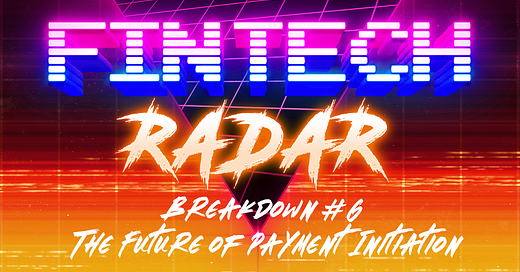
Discover more from Fintech Radar
Issue #125: Pix Expands To Europe, PayPal & Adyen Take on Stripe Link, and Amazon’s India Payments Spin-Off Plan
👋 Welcome back to another edition of Fintech Radar!
If you’re new, here is a breakdown of what you can expect from each issue.
If you missed our recent editions, you can catch up here. Some previous issues you might want to check out if you’re new include “A Deep Dive Into The Cash App's Growth Machine”, “The Future Of Payment Initiation”, and “Current: Doing It Differently”.
Your ad could be HERE!
Fintech Radar is a must-read for founders, operators and investors in fintech. If that’s your target audience, placing an ad right HERE is a cost-effective way to reach them.
If this sounds like a good fit for your brand, head to our sponsorship page for more details and to secure your advertising slot. Prices start at $100 per issue!
If you have any questions, reply to this email and ask away!
🇪🇺 Pix Expands In Europe, The Payers
🏃♂️ Rundown: Pix is expanding into Europe through a partnership with Wipay and PagBrasil. Initially, Pix payments will be implemented in vending machines at Barcelona Airport, allowing instant payments via Q.R. code.
🥡 Takeaway: Forget Demur or Brat Summer; in fintech, it’s shaping up to be a faster-payment summer. The big two (Pix and UPI) are steadily advancing their cross-border expansions as they compete for global ubiquity. Beyond this announcement, Switzerland also joined the faster payments festivities this week by launching instant payments.
While this deal isn’t as expansive as other recent agreements between faster payment rails (like the one between India’s UPI and four Southeast Asian countries), it underscores a growing trend: countries are increasingly pushing to take their local payment systems global. This is still one of the most under-discussed payment trends in 2024, so keep an eye on how this unfolds, as it will be a big story in cross-border payment in the coming years.
🤝 While PayPal's Fastlane Accelerates With Adyen, Analyst Flags Some Bumps On The Road Ahead, Benzinga
🏃♂️ Rundown: PayPal has expanded its strategic partnership with Adyen to introduce PayPal’s Fastlane Payments for enterprise and marketplace customers in the U.S., with plans for a global rollout.
🥡 Takeaway: I’m not sure I fully get this partnership. It might seem like a win-win (if you squint), allowing both companies to leverage their distribution strengths. But it doesn’t quite add up. For instance, Adyen appears to be opting out of building its own competitor to Stripe Link, focusing instead on distributing PayPal’s Fastlane product. Meanwhile, PayPal is choosing to hand off enterprise checkout customers to Adyen rather than using Braintree as the channel—likely sharing a slice of the processing revenue.
In other words, both parties could enter the instant checkout game without needing each other. Strategically, you’d think it would make more sense for each to go it alone in the long run.
This partnership feels more like a temporary arrangement than a long-term strategy for either party. I wouldn’t be surprised if it evolves—or dissolves—sooner rather than later.
🇳🇿 Klarna Acquires Laybuy In New Zealand, Klarna
🏃♂️ Rundown: Klarna has acquired Laybuy's assets in New Zealand and plans to relaunch the brand. Laybuy, a popular BNPL provider, had over half a million users and 10,000 merchants before ceasing operations in June.
🥡 Takeaway: This is a solid pick-up for Klarna, giving them a slight leg up in the growing New Zealand market. However, this acquisition likely amounts to purchasing Laybuy’s customer list and some local operational capacity, so it may not be a game-changer for Klarna’s New Zealand business. Still, it’s good to see the once high-flying BNPL startup’s assets being put to good use.
🇮🇳 Amazon In India Considers Splitting Off Payments App, Finextra
🏃♂️ Rundown: Amazon has reportedly sought approval from the National Payments Corporation of India to split Amazon Pay into a standalone app.
🥡 Takeaway: Flipkart recently took a similar approach by consolidating its fintech offerings into a single vertical. Although Amazon seems to be considering a full spinout of its payment offering, this reflects a growing trend in the Indian market towards more specialised fintech products and a shift away from the super app approach popular in many markets across Asia and the subcontinent.
Amazon Pay currently ranks sixth in UPI usage in India, and this move could provide a significant boost to their Indian payments product. A dedicated app focused solely on payments, rather than just another tab on the e-commerce giant’s platform, could better meet user needs and accelerate its growth in the Indian market. I’m very interested to see how this plays out.
👮♂️ ASIC Set To Ramp Up Crypto Scrutiny As Industry Fears Licensing Regime, The Capital Brief
🏃♂️ Rundown: According to the article, ASIC is looking to intensify its regulation of the cryptocurrency industry by drafting new guidance, which may require crypto exchanges to obtain licences ahead of forthcoming legislation.
🥡 Takeaway: The Aussie corporate and financial services regulator has been on one lately, with numerous high-profile cases against crypto companies (which have yielded mixed results). Although it’s possible that ASIC might take a more expansive approach in the info sheet update—especially given the delay in Australia’s proposed new crypto regulations—the chances of that happening seem slim. Personally, I’d expect the updates to Information Sheet 225, mentioned in the article, to largely reflect the outcomes of the recent cases in which ASIC has been involved.
🤖 Skyfire lets A.I. agenA.I. spend your money, Techcrunch
🏃♂️ Rundown: Skyfire Systems announced their $8.5m seed round, which was raised from Neuberger Berman, Inception Capital, Arrington Capital, and other investors. The company has launched a payment network that allows A.I. agents to make autonomous transactions while ensuring safeguards against overspending.
🥡 Takeaway: Another week, another A.I. agent-focused payments company raises a round. As I mentioned when I covered Payman’s raise a few weeks ago, this segment is one of the few genuinely fresh takes in the A.I. x fintech space—at the very least, it’s not just another A.I. customer support bot or co-pilot.
If A.I. agents are indeed the next big wave, it makes sense that a native payments platform tailored to these agents will emerge. Just as OpenAI and Perplexity are challenging Google in search by attacking from a different angle, A.I. agents could carve out a new pathway for innovative payments startups. This is definitely a segment worth monitoring, especially if A.I. agents really do pop off.
🇧🇷 Lux Capital's $4M Bet on Brazil’s Magie, Technews180
🏃♂️ Rundown: Brazilian fintech Magie has secured $4m in seed round from Lux Capital, marking the firm's first investment in Brazil and bringing Magie’s total funding to $5.1m. The AI-powered assistant allows users to send money and pay bills via WhatsApp.
🥡 Takeaway: WhatsApp is a massively under-discussed channel for fintechs in the West, yet it’s already a cornerstone of how users manage their financial lives in many markets. In LATAM, several players are leveraging WhatsApp for everything from customer service to remittances, tapping into the app’s 2.7 billion users worldwide.
Magie’s use of WhatsApp for financial transactions reflects a broader trend: the potential for messaging apps to become central hubs for financial services. It’s also an interesting take on trust, which operates differently from the trust dynamics we often see in Western markets.
This is more of a riff than a prediction that we’ll see this model play out in the West. Still, it’s fascinating to consider how different approaches to fintech and trust have led to such distinct modes of interaction.
🍞 Aman Narang: 5 Lessons Scaling Toast to $14BN Market Cap, 20VC
This was a great interview with Aman Narang, Co-Founder and CEO of Toast. In it, he discusses the start of the product and how they thought about adding embedded F.S. offerings into their product, among a range of other topics.
💸 Rishi Garg’s M&A Playbooks from Twitter and Square, Turpentine Finance
Although not fintech-specific, this episode is a goldmine for anyone interested in tech M&A. Rishi Garg, who led Corporate Development at Twitter and Square, shares what makes acquisitions work for both sides of the table. Also, the fact that he managed 15 acquisitions in a single year at Twitter? Wild. Definitely worth a listen!
❤️ Show Some Love For F.R.
📧 Feel free to reach out if you want to connect. I'm @alantsen on Twitter, or you can D.M. me directly by clicking the button below ↴
Ps. If you like what I'm doing with F.R., please share it on your social disinformation network of choice. I'd also appreciate it if you forwarded this newsletter to a friend who might enjoy it.
🙏 What did you think of this week's issue of F.R.?
I Loved it ◌ I Like It ◌ Not Bad ◌ I Don’t Like It ◌ It’s Awful


















Regarding the interconnectivity of instant payment network. I agree, we should be discussing it more openly. It's fascinating to see how this is playing out under Project Nexus in ASEAN. I believe this will drive M&A activity for some incumbents who want to "stay in the game". What are your thoughts and would love to get your view of the Nexus Scheme Organisation that is being established.